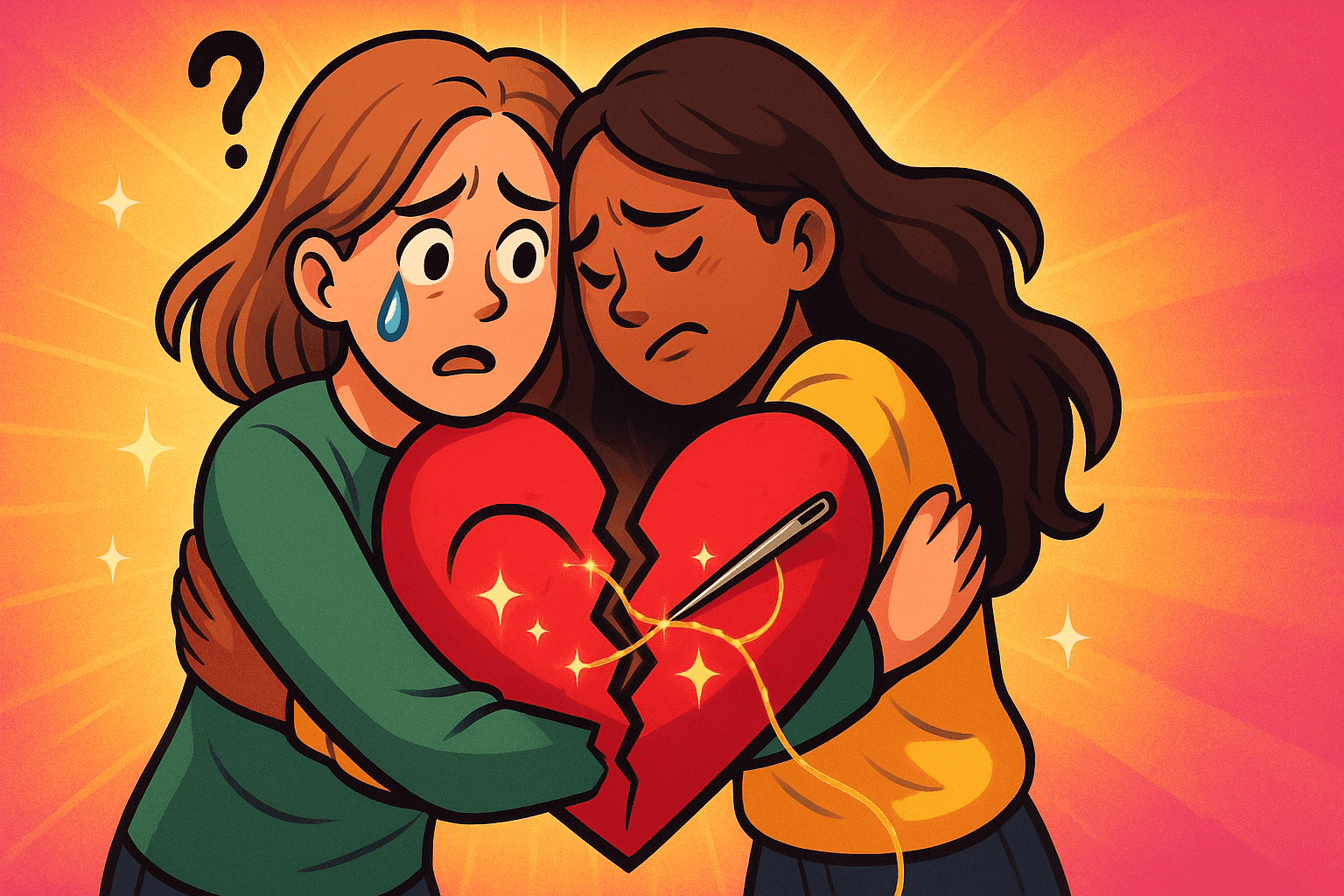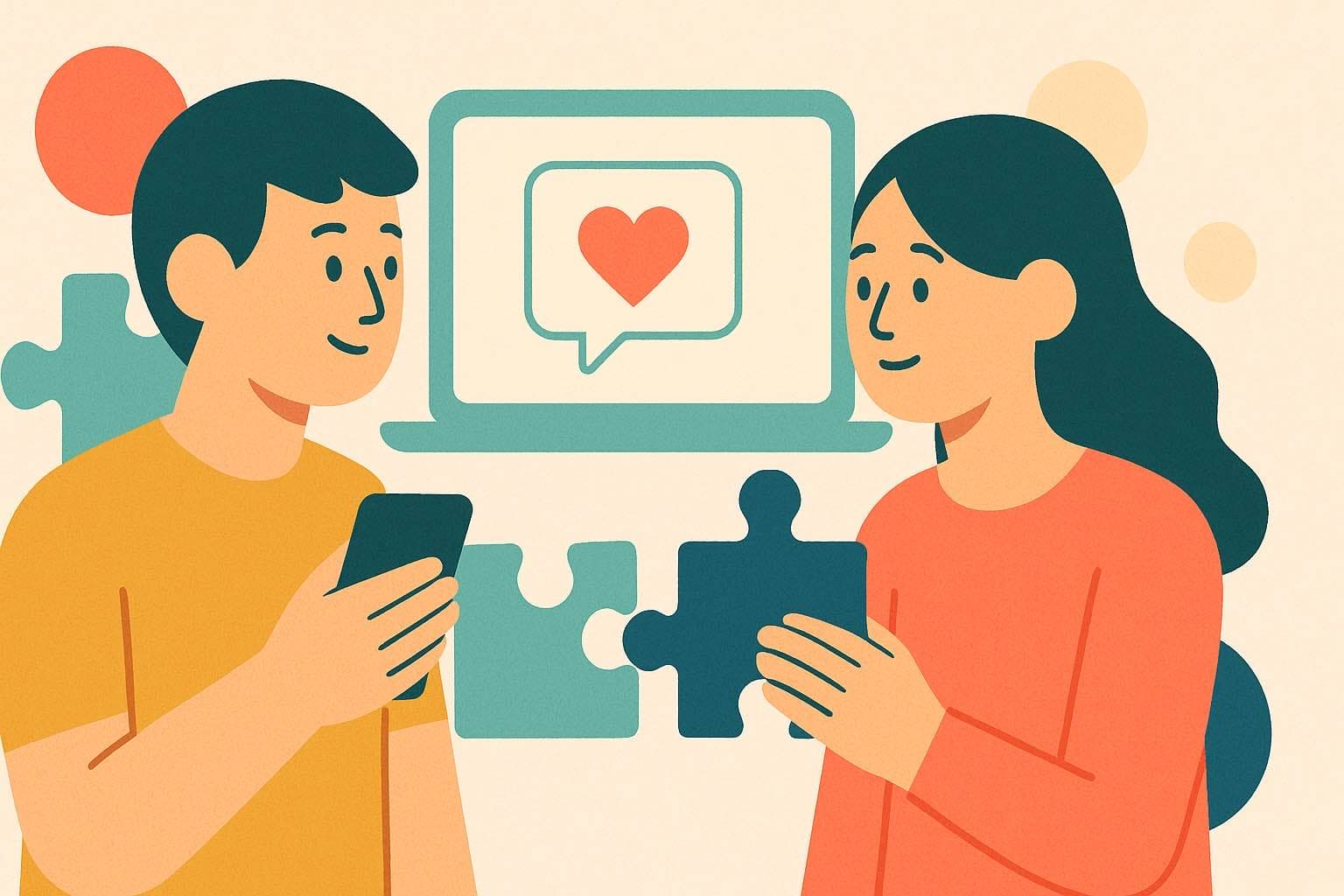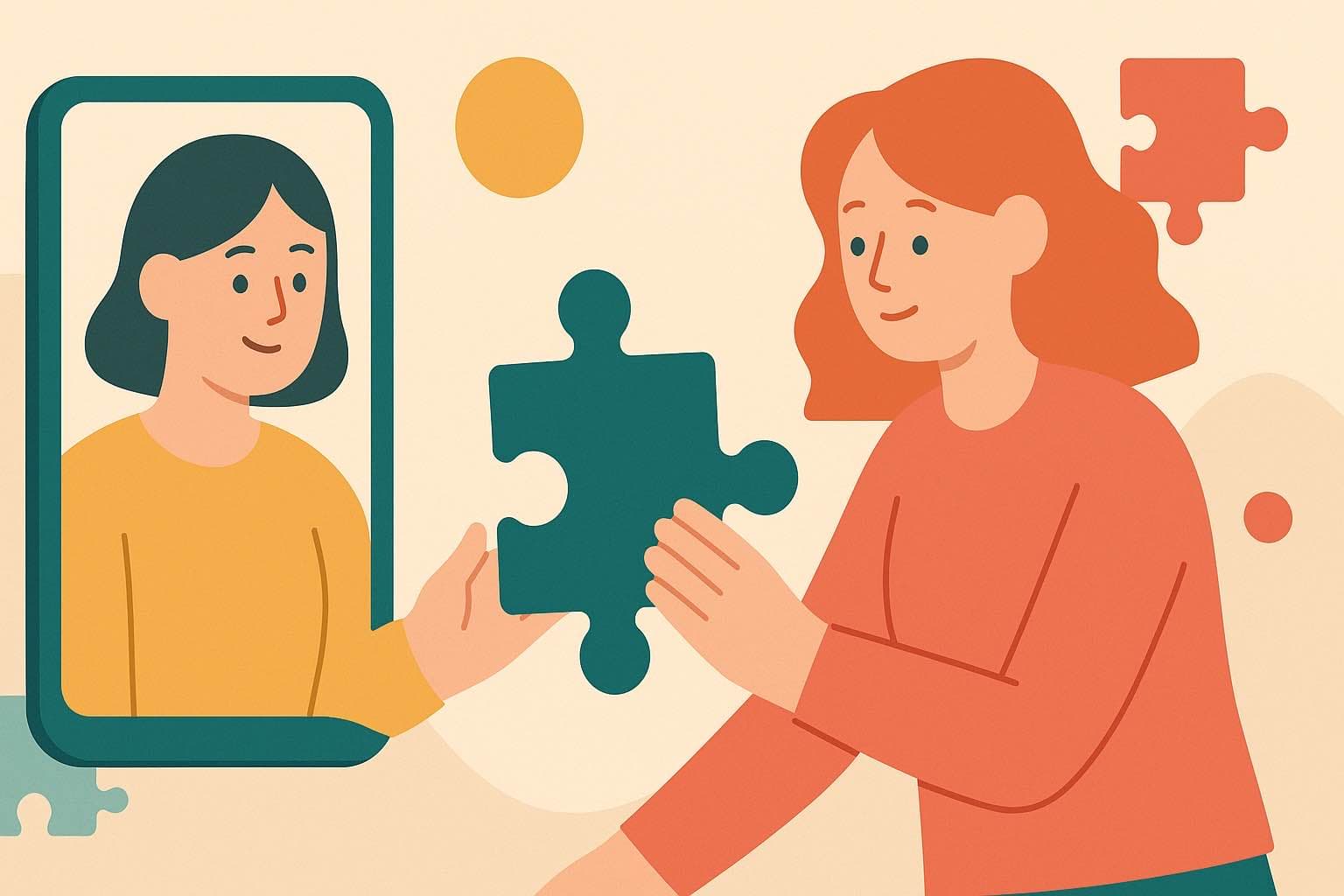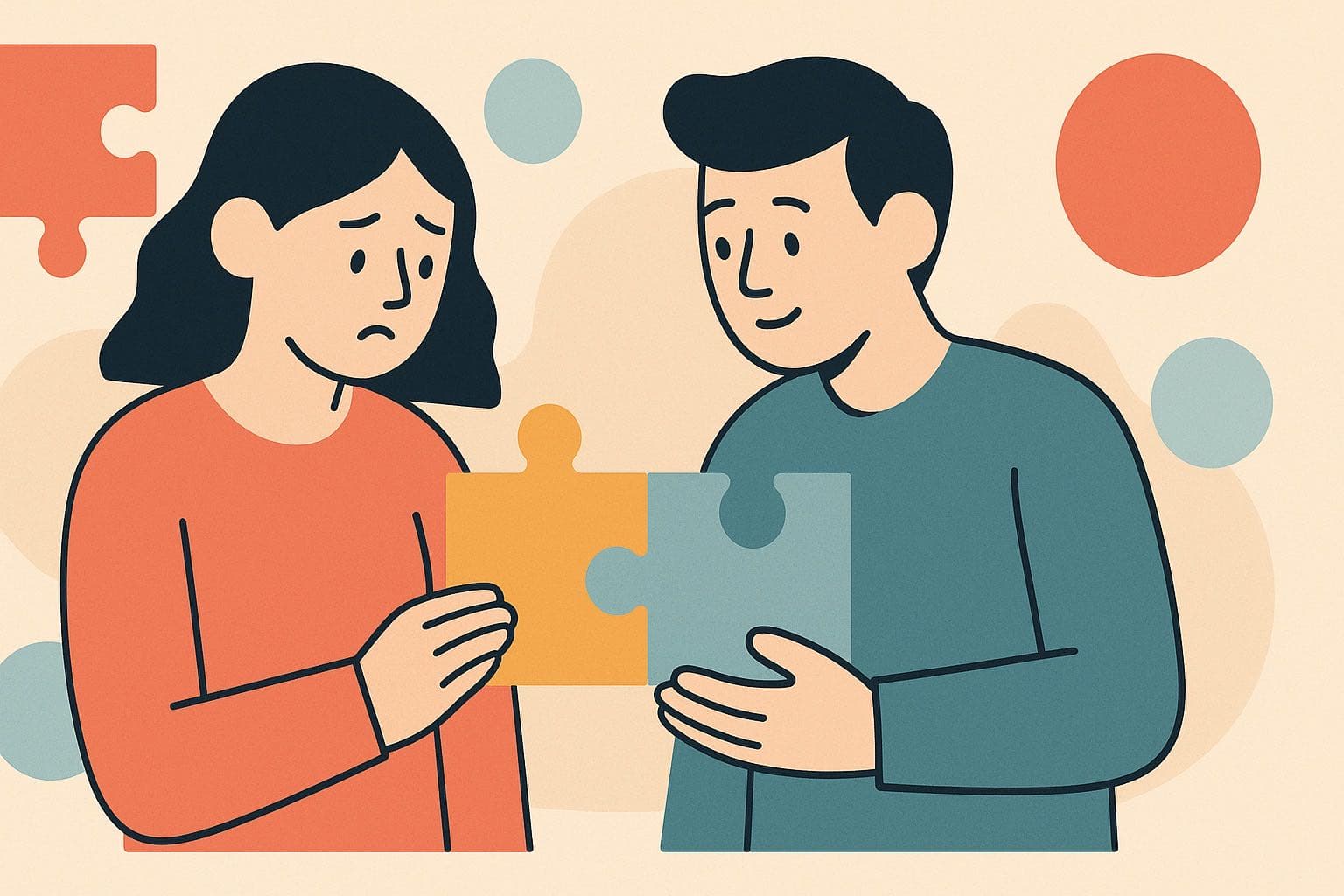How to Apologize to a Friend You Hurt: 7 Proven Steps to Heal Your Friendship
Learn how to apologize to a friend you hurt with proven steps that rebuild trust. Expert advice on friendship repair, forgiveness, and healing damaged relationships.

Friendships make our lives worth it. However, even the strongest friendships face moments when hurtful words are spoken or thoughtless actions cause pain. When you realize you've hurt someone you care about, knowing how to apologize to a friend you hurt becomes essential for preserving and strengthening your relationship.
Key Takeaways
Before diving into how to apologize to a friend you hurt, here are the essential points you need to understand:
- Genuine apologies require complete ownership of your actions without making excuses or deflecting blame
- Understanding your friend's perspective is more important than defending your intentions
- Actions must follow words - promises of change need to be backed by consistent behavior
- Patience is crucial because forgiveness often takes time, even after a sincere apology
- The quality of your apology matters more than perfect timing - focus on being authentic rather than rushing
The path to healing begins with understanding what went wrong and taking responsibility for your part in it. Whether you said something insensitive, broke a promise, or betrayed their trust, the right approach to apologizing can transform a moment of conflict into an opportunity for deeper connection.
Research shows that effective apologies not only repair relationships but also contribute to better mental health for both parties involved. According to Harvard Medical School, genuine apologies validate the other person's feelings while demonstrating emotional intelligence and respect.
Understanding Why Apologies Matter in Friendships
The Role of Apologies in Friendship Recovery
Friendships differ from romantic relationships or family bonds in significant ways. Unlike family ties, friendships are voluntary relationships that can end if not properly maintained. This makes learning how to apologize to a friend you hurt even more critical.
Apologies serve multiple functions in friendship repair:
Trust restoration happens when you acknowledge wrongdoing and commit to change. Your friend needs to see that you understand the impact of your actions.
Emotional validation occurs when you recognize their hurt feelings as legitimate. This shows respect for their emotional experience.
Relationship investment demonstrates that you value the friendship enough to be vulnerable and admit mistakes.
Studies in friendship psychology reveal that unresolved conflicts can permanently damage relationships, while sincere apologies often lead to stronger bonds than existed before the conflict.
Psychological Benefits of Sincere Apologies
When you properly apologize to a friend you hurt, both parties experience psychological benefits. The apologizer gains relief from guilt and shame, while the hurt party feels heard and valued.
Research indicates that effective apologies:
- Reduce stress hormones in both individuals
- Increase feelings of empathy and connection
- Improve overall relationship satisfaction
- Enhance emotional intelligence skills
The Psychology Behind Effective Apologies
What Makes an Apology Effective
Understanding the psychological components of effective apologies helps you craft messages that truly heal. According to Stanford University's Forgiveness Project, genuine apologies contain specific elements that facilitate forgiveness.
Cognitive acknowledgment means clearly stating what you did wrong without minimizing or excusing the behavior.
Emotional expression involves genuinely conveying remorse and understanding the pain you caused.
Behavioral commitment requires promising specific changes and following through consistently.
The Neuroscience of Forgiveness
Recent neuroscience research shows that when someone receives a sincere apology, their brain's threat detection systems calm down. This biological response makes forgiveness more likely and helps restore the friendship's emotional safety.
The brain processes apologies differently than other forms of communication, activating areas associated with:
- Social bonding and connection
- Emotional regulation and calm
- Trust and future prediction
- Empathy and perspective-taking
7 Essential Steps to Apologize to a Friend You Hurt
Step 1: Acknowledge What You Did Wrong
The first step in learning how to apologize to a friend you hurt is clearly identifying your specific actions or words that caused harm. Vague apologies like "I'm sorry if I hurt you" shift responsibility and suggest uncertainty about wrongdoing.
Instead, be specific:
"I'm sorry for sharing your personal information with others when you asked me to keep it confidential."
"I apologize for canceling our plans at the last minute without giving you proper notice."
This specificity shows you understand exactly what went wrong and demonstrates that you've reflected on your behavior.
Step 2: Take Full Responsibility
Accepting complete responsibility without excuses or justifications is crucial. Avoid phrases that deflect blame or minimize your role:
❌ "I'm sorry, but I was stressed"
❌ "I'm sorry you feel that way"
❌ "I'm sorry if I misunderstood"
✅ "I was wrong to do that"
✅ "My actions hurt you, and that's on me"
✅ "I take full responsibility for my behavior"
Taking responsibility demonstrates maturity and shows your friend that you're not trying to escape accountability.
Step 3: Express Genuine Remorse
Your friend needs to hear that you truly regret your actions and the pain they caused. This isn't just about feeling bad for yourself – it's about understanding and caring about their suffering.
Effective expressions of remorse include:
"I deeply regret hurting you" "I feel terrible about the pain I caused" "I'm genuinely sorry for damaging your trust"
Your tone and body language must match your words for the remorse to feel authentic.
Step 4: Listen to Their Feelings
After apologizing, give your friend space to express how your actions affected them. This step is often overlooked but it's essential for healing.
Active listening techniques:
- Make eye contact and put away distractions
- Avoid interrupting or defending yourself
- Ask clarifying questions to show you're engaged
- Reflect back what you hear to confirm understanding
Remember, this conversation is about their experience, not your intentions.
Step 5: Make Amends When Possible
Actions speak louder than words. If there's a concrete way to repair the damage, offer to do so. This might involve:
- Correcting misinformation you spread
- Replacing something you damaged
- Making up for missed commitments
- Investing extra time in the friendship
However, respect their wishes if they decline your offers to make amends.
Step 6: Promise Specific Changes
Vague promises to "do better" aren't enough. Your friend needs to understand exactly how you'll prevent similar situations in the future.
Examples of specific commitments:
"I will always ask before sharing anything you tell me" "I'll give you at least 24 hours notice if I need to cancel plans" "I'll check with you before making decisions that affect both of us"
Only make promises you can realistically keep, as broken commitments will damage trust further.
Step 7: Give Them Time and Space
Don't expect immediate forgiveness. Healing takes time, and pressuring your friend to "get over it" quickly can backfire.
Respectful ways to give space:
- Let them know you're available when they're ready to talk
- Don't repeatedly bring up the incident
- Continue showing changed behavior without expecting praise
- Be patient with their processing time
Remember that forgiveness is a gift they may choose to give, not something you can demand.
What to Say: Sample Apologies for Different Situations
For Betraying Trust
"I want to apologize for telling Sarah about your job interview when you specifically asked me to keep it confidential. I violated your trust, and there's no excuse for that. I understand this makes you question what else you can share with me, and I don't blame you for feeling that way. Going forward, I will always ask for your explicit permission before discussing anything you tell me. I hope I can earn back your trust over time."
For Saying Something Hurtful
"I'm deeply sorry for the cruel comment I made about your appearance. My words were completely inappropriate and hurtful, regardless of how frustrated I was feeling. I know how much that comment hurt you because you trusted me enough to share your insecurities with me. I promise to think before I speak and never use personal information to hurt you again."
For Being Unreliable
"I apologize for repeatedly canceling our plans at the last minute. I realize this makes you feel like your time isn't valuable to me, which isn't true at all. You deserve a friend who honors commitments and shows up when they say they will. From now on, I'll only make plans I can keep, and if an emergency arises, I'll give you as much notice as possible."
Common Apology Mistakes to Avoid
The Non-Apology Apology
Phrases like "I'm sorry you feel that way" or "I'm sorry if I hurt you" aren't real apologies. They shift blame to the hurt person and suggest you don't believe you did anything wrong.
Making Excuses
While context can be helpful, don't let explanations become excuses. Your friend doesn't need to hear about your stress, your bad day, or your good intentions when they're processing their hurt.
Demanding Immediate Forgiveness
Saying "I said I was sorry, what more do you want?" pressures your friend and shows you don't understand the healing process. Forgiveness can't be rushed or demanded.
Repeating the Same Mistakes
If you apologize but continue the same hurtful behavior, your apologies become meaningless. Consistency between words and actions is essential for rebuilding trust.
Making It About You
Don't turn the apology into a chance to seek comfort or reassurance. Focus entirely on your friend's experience and feelings, not your own guilt or need for forgiveness.
When Your Friend Doesn't Accept Your Apology
Understanding Rejection of Apologies
Sometimes, despite your best efforts to apologize to a friend you hurt, they may not be ready to forgive or reconcile. This can happen for several reasons:
- The hurt was too deep or the trust too damaged
- They need more time to process their feelings
- Previous apologies weren't followed by changed behavior
- They're protecting themselves from future hurt
Respect their decision and don't take it as a personal attack.
How to Respond Gracefully
When your apology isn't accepted:
Acknowledge their right to choose: "I understand you're not ready to forgive me, and I respect that decision."
Reaffirm your commitment to change: "I'm still committed to changing my behavior, regardless of whether our friendship continues."
Leave the door open: "If you ever want to talk in the future, I'm here."
Don't pursue aggressively: Give them genuine space rather than repeatedly trying to reconnect.
When Friendships Don't Survive
Sometimes relationships end despite sincere apologies. While painful, this outcome teaches valuable lessons about treating others with respect and care. The experience of learning how to apologize to a friend you hurt, even if unsuccessful, builds emotional intelligence for future relationships.
Rebuilding Trust After the Apology
The Trust Recovery Process
Apologizing is just the beginning of rebuilding trust. Your friend will likely watch your actions carefully to see if you've truly changed.
Consistency is key: Small, reliable actions over time rebuild trust more effectively than grand gestures.
Transparency helps: Be open about your thought processes and decision-making to show you're considering their feelings.
Patience matters: Trust rebuilds slowly, so don't rush the process or expect immediate returns to normalcy.
Practical Steps for Trust Building
- Follow through on every small promise you make
- Check in periodically about how they're feeling
- Be proactive about avoiding similar situations
- Show consideration for their feelings in daily interactions
- Celebrate small steps forward without demanding more
Remember that rebuilding trust is a marathon, not a sprint.
Signs of Progress
Positive indicators that trust is returning include:
- Your friend initiates conversations
- They share personal information again
- They make future plans with you
- Their body language becomes more relaxed
- They laugh and joke with you naturally
The Science of Forgiveness in Relationships
Research on Friendship Forgiveness
Scientific studies reveal fascinating insights about how to apologize to a friend you hurt effectively. Research published in Scientific Reports shows that apologies promote forgiveness by communicating relationship value.
Key findings include:
- Apologies work better when they clearly show you value the relationship
- The perceived sincerity of the apology matters more than perfect wording
- Forgiveness benefits both physical and mental health
- People are more likely to forgive friends than acquaintances
The Health Benefits of Forgiveness
When friendships successfully navigate conflict through apology and forgiveness, both parties experience:
Physical health improvements:
- Lower blood pressure and heart rate
- Reduced stress hormone levels
- Better sleep quality
- Stronger immune function
Mental health benefits:
- Decreased anxiety and depression
- Improved self-esteem
- Greater life satisfaction
- Enhanced emotional regulation
These benefits explain why learning how to apologize to a friend you hurt is so important for overall well-being.
Frequently Asked Questions
How long should I wait before apologizing to a friend I hurt?
Apologize as soon as you realize you've caused hurt, but ensure you've taken time to understand what you did wrong and why it was harmful. A rushed apology without genuine understanding can make things worse.
Should I apologize through text, call, or in person when I've hurt my friend?
In-person apologies are generally most effective for serious hurts because they allow for full communication including body language and tone. However, if distance makes this impossible or your friend prefers written communication, a thoughtful message can work. Avoid casual texts for significant apologies.
What if my friend says they forgive me but their behavior suggests otherwise?
Forgiveness is a process, not an instant decision. Your friend may intellectually forgive you while still processing emotional hurt. Continue demonstrating changed behavior and give them time to fully heal. Don't pressure them to "act normal" immediately.
How many times should I apologize for the same mistake?
One sincere, comprehensive apology is usually sufficient. Repeatedly apologizing can become annoying and suggest you don't trust their intelligence or ability to process what you've said. Focus on changed behavior rather than repeated words.
Can I ask mutual friends for advice about how to apologize to a friend I hurt?
Be cautious about involving others in your conflict. If you do seek advice, choose someone who won't gossip and who understands the importance of confidentiality. Sometimes talking to a neutral party or counselor is more appropriate.
What if I don't think what I did was that bad, but my friend is really hurt?
Your friend's feelings are valid regardless of your intentions. Impact matters more than intent. Try to understand their perspective and apologize for the hurt you caused, even if you didn't mean to cause it.
Conclusion
Learning how to apologize to a friend you hurt is one of the most valuable relationship skills you can develop. While it requires vulnerability, humility, and patience, the process often strengthens friendships and builds deeper trust.
Remember these key principles:
- Authenticity matters more than perfection in your apology
- Understanding their perspective is more important than defending your intentions
- Consistent actions speak louder than repeated words
- Time and patience are essential ingredients in the healing process
- Not all relationships survive, but the lessons learned always have value
The ability to take responsibility, express genuine remorse, and commit to change reflects emotional maturity and respect for others. These skills will serve you well in all your relationships, creating deeper connections and more meaningful bonds.
Whether your friendship emerges stronger or you must part ways, approaching conflict with sincerity and care honors both yourself and your friend. True friendship sometimes means accepting difficult truths about ourselves and working to become better people.
The path to healing begins with a single step: acknowledging when we've caused harm and taking responsibility for making things right. In a world where genuine connection feels increasingly rare, mastering the art of sincere apology helps preserve and nurture the relationships that matter most.
That friendship you're avoiding? It's slipping away every day you wait. Use Peachi to bridge the gap before it becomes permanent.
About the Author: This article draws from extensive research in relationship psychology, forgiveness studies, and expert advice from Harvard Medical School, Stanford University, and peer-reviewed psychological research on friendship dynamics and conflict resolution.
Related Articles

Digital Tools for Friendship Restoration for Teens and College Students: 7 Apps That Actually Work
Discover 7 powerful digital tools that help teens and college students repair broken friendships. From AI coaches to structured conversations, learn how to fix friendships fast.

Digital Tools for Friendship Restoration: How to Blend Online and Offline Repair
Discover proven digital tools and strategies to restore damaged friendships. Learn how to combine online platforms with offline actions for meaningful reconciliation.

Conflict with a Friend? Here's the Step-by-Step Fix
Learn how to fix a friendship after conflict with proven communication strategies, emotional repair techniques, and actionable steps to rebuild trust.

How to Survive a Friend Breakup When You Share the Same Friend Group (Without Losing Your Mind)
Friend breakups hurt worse when you share the same social circle. Learn proven strategies to heal, set boundaries, and navigate awkward group dynamics without losing yourself.